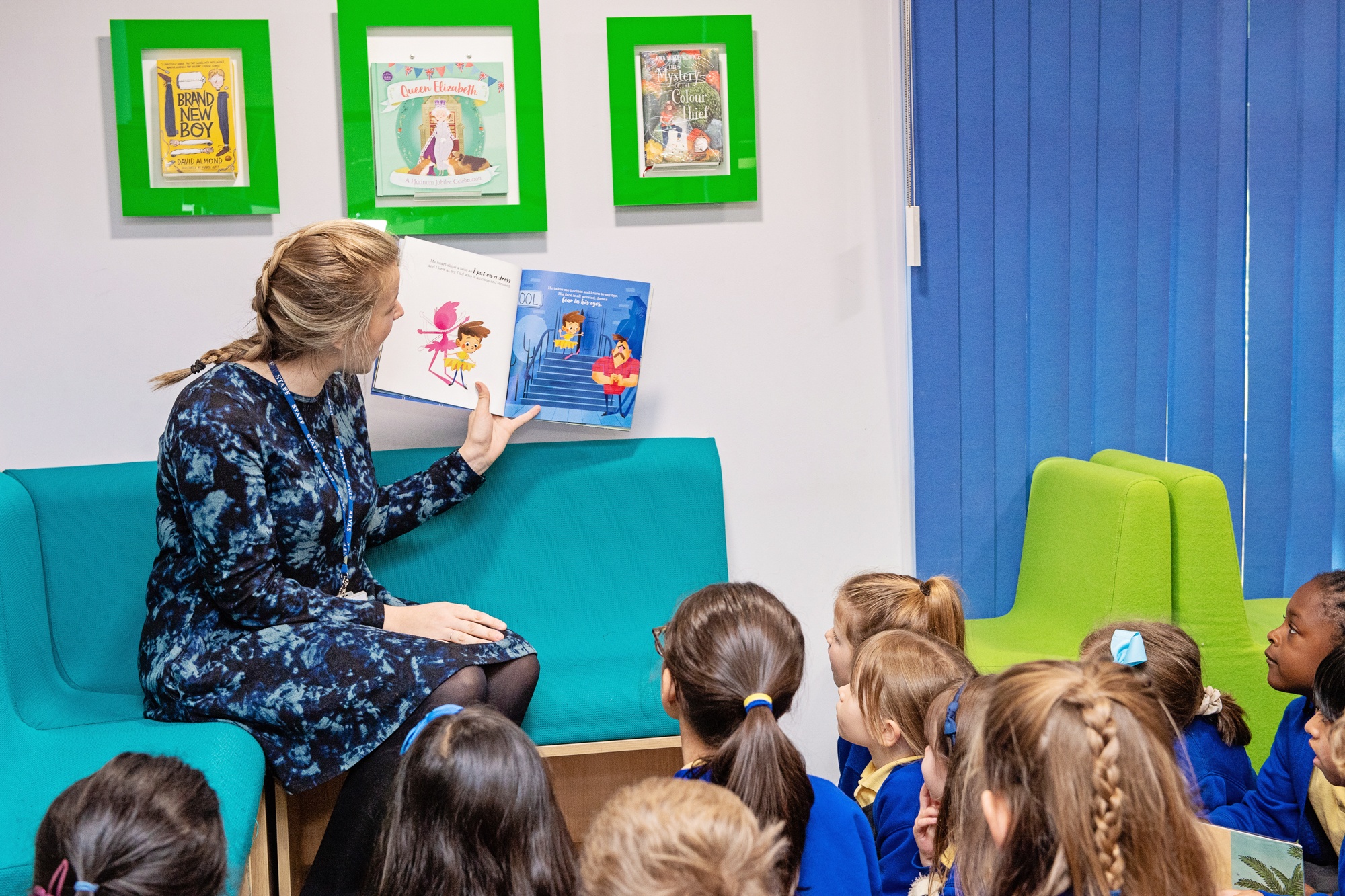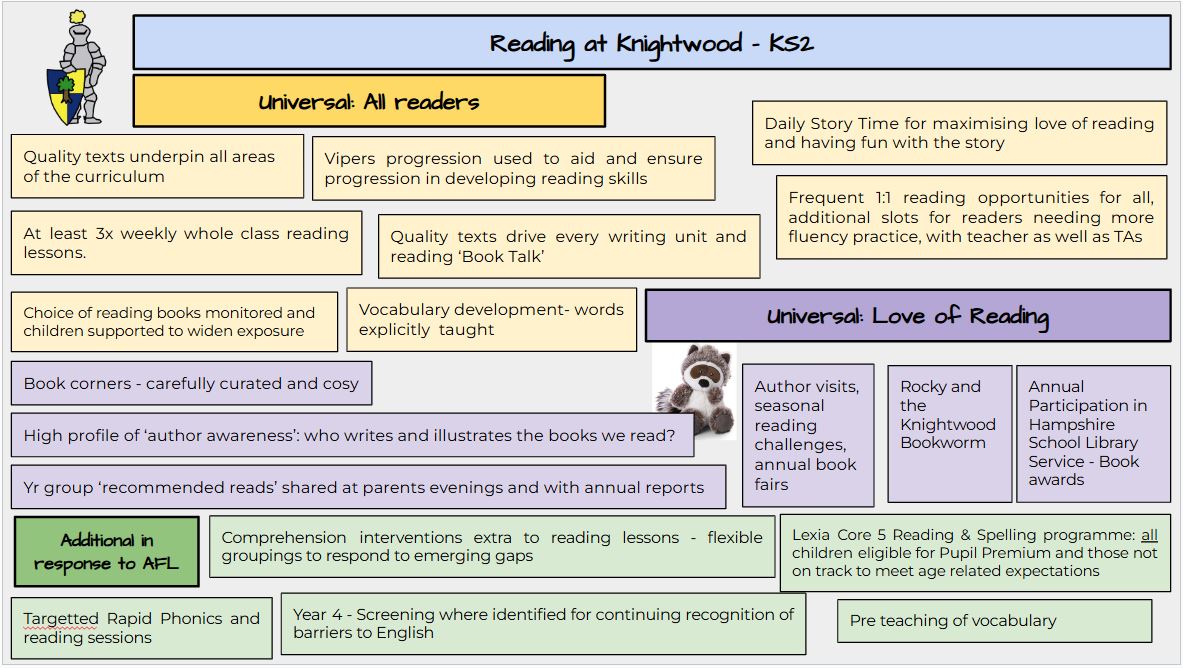Phonics and Early Reading
"Reading is a passport to countless adventures."
Mary Pope Osborne
The foundation for reading is being able to turn sounds into letters and, for this, children need to be taught phonics. To teach phonics at Knightwood we follow the systematic programme Bug Club. The children are introduced to Bug Club when they start in Reception. Their lessons are fun and interactive and allow them to revise previous sounds, learn and practise the new sound and then apply their learning. As the children learn new sounds they are given books that allow them to practise decoding and blending these sounds. As the children gain confidence with their reading they will also be given a colour banded book from the Bug Club Independent range. Alongside these books children will always be able to take home a library book each week. When children are secure in their phonics knowledge (usually by year 2) they will be solely on the Bug Club Independent books until they are ready to become a free reader and no longer use the reading scheme.
At the moment Bug Club is predominately on an online platform. The benefits to this are the children can access their books anywhere there is a electronic device (iPad, computer, phone etc), they can earn coins for reading and then access a rewards section and they are able to play games and answer comprehension questions to support their phonics knowledge and reading. However, we do recognise the importance of printed books and there are copies available if needed. We are also aiming to increase the amount of printed books we have available.
Children will be sent home with a phonics book for them to read to you. They should aim to read this book to you several times in a week to help build on their fluency. You can also help them by hearing their speed sounds and words on the front few pages of the book and asking them the questions in the back. Your child will also bring home a ‘sharing’ book. This is a book for you to read together and enjoy. The purpose of this book is to help aid their enjoyment of reading.
Support for children struggling with reading
We are proud of being an inclusive school that supports all pupils to succeed in their learning and build self-esteem. Reading is such a complex process that it is understandable that some children struggle with it. If your child is finding it hard and is not where we would expect them to be then first, their teacher will have a conversation with you. The following support is available depending on the needs of the child:
- Phonics support booster groups with teachers or LSAs
- Sounds and activities sent home
- Lexia Core5
- KS2 - Rapid reading intervention programme
- Wave 3 interventions such as AcceleRead AcceleWrite, SYDNEY, Precision teaching
How can I help my child read?
- In the front of the books, there are guides to warming up before reading and then throughout the online versions there are questions for you to talk about and guide your discussions - these can be found at the back of the printed books.
- Model being a reader! Set a good example by sharing your reading. Let your children see that you value books and keep them at home.
- Point out words all around you. Help your child to read the words around them: on food packets in the supermarket, on buses, in newspapers, in recipes.
- Go to the library together. Ask the librarian for help in finding books your children will enjoy.
- Make time to read. Try to read with your child at the same time every day. Bedtime is a great time to share a story. Why not let your child choose a story? Your child is never too old to enjoy a good story – keep reading to them even when they can read themselves.
- Introduce your child to different types of books; classic fiction, chapter books, short stories, joke books, poetry, non-fiction.
- Read slowly, with expression. Try using different and funny voices for characters!
- Keep books in your bag. A long wait at a doctor’s surgery or at a bus stop can seem less boring if you share a book.
- If English is not your family’s first language, you can buy dual language books. You can talk about books and stories in any language.
What do I do when my child has read the books?
Once you have read the book and clicked on the bugs and completed the comprehension activities, the book will move to the library section. We encourage you to read the book a few times over the week to increase fluency and understanding of the new sounds they are learning.
When will my child be moved to the next stage in the reading scheme?
Each band contains a wide variety of books and the children are given a wide range of books to consolidate their reading at each stage. Each child’s reading is assessed during individual reading sessions at school. Your child will be moved to the next band when certain criteria have been met both in decoding skills and comprehension skills. A firm foundation at these early stages of reading is vital.
Follow this link to learn about Bug Club:
https://www.youtube.com/watch?v=44mZZQfgkjY
Here is help in knowing how to say the sounds:

